William Pirrie, the Titanic and Home Rule
Published in 20th-century / Contemporary History, Features, Home Rule, Issue 2(March/April 2012), Volume 20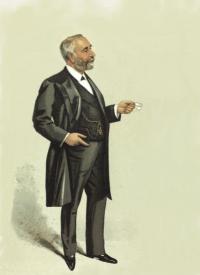
William Pirrie. Born in Quebec on 24 May 1847 to James Alexander Pirrie and Elizabeth Margaret Swan Montgomery, William returned to live in Conlig, Co. Down, when he was two, following the death of his father. His grandfather was Captain William Pirrie, a Belfast shipowner and harbour commissioner who encouraged his ambitions. He attended the Royal Belfast Academical Institute before entering Harland & Wolff as a premium apprentice in 1862. In 1874 he was made a partner and became chairman in 1895, a role he maintained until his death on 7 June 1924 whilst holidaying on his yacht in South America. (Harland & Wolff)
Of all the shadows cast by history, none stretch further than the enduring fascination associated with the Titanic. In popular culture it has transcended the purpose for which it was built, eclipsed the environment from which it came and relegated to the background the men whose needs brought about its birth. This year we will celebrate the Titanic as a symbol. Belfast will extol her as the product of a proud city with a fine pedigree in engineering and world-class workmanship.But 1912 was also the year in which the threat of Home Rule once again fell over Belfast. With the veto power of the House of Lords removed, Home Rule now seemed imminent. As they had been in 1886 and 1892, the leading industrialists and businessmen of the city seemed unanimous in their opposition. Those who benefited from the economic union with Britain were loath to see it severed and their industries placed under the rule of a Dublin parliament scornful of their industrial might. Violence and rioting erupted; Catholic shipyard workers were victims of sectarian prejudice within a predominantly Protestant workforce. Religious intolerance was no doubt a factor, but the economic implications of Home Rule were what mattered to the businessmen of Belfast. As Belfast grew, so too did their importance, and many became leading public figures in the city. Political unrest was disastrous to economic vitality; between 1865 and 1913 the growing threat of populist and anti-big-business nationalism had negative implications for the provincial stock market. Why, then, did William Pirrie, the Presbyterian chairman of Harland & Wolff, align himself with Home Rule, a policy viewed as the death knell for Belfast’s industrial vitality?
Growth of Belfast and genesis of Harland & Wolff
Long before rivets and plates were forged into iron leviathans in the yards of Harland & Wolff, there was a growing concentration of industry in the north-eastern counties of Ulster. Linen textile manufacturing became highly concentrated in the Lagan Valley, where water was easily harnessed to power the mills. Linen soon outstripped rival industries such as cotton, and when coal began to be used it was easily imported through the port of Belfast. And that might have been that, had not a gifted young engineer, Edward James Harland, responded to an advertisement posted by Robert Hickson, a man who had tried his luck at manufacturing iron plates and, later, ships. In 1857 the young Harland recruited an assistant and bought out Hickson for £5,000. By 1861 the assistant, Hamburg-born Gustav Wilhelm Wolff, had been made a partner and the firm was renamed to acknowledge the change. Harland & Wolff was thus born.
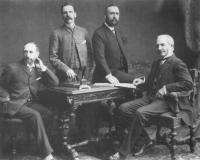
The original partners, 1876–85—(left to right) Gustav W. Wolff, W.H. Wilson, William J. Pirrie and Edward J. Harland. (Harland & Wolff)
Through personal business contacts and an excellent reputation for innovative engineering the yard prospered and expanded. As it grew, so too did Belfast. Subsidiary industries grew up around shipbuilding and skilled men were imported from Britain, bringing with them their skills, their religions and their prejudices, which would shape Belfast. The cost of living was lower in Belfast, where women could hope to find employment in the thriving linen trade, thus raising their family’s income and standard of living. Belfast’s growth strengthened its ties with the British Empire, which provided not only raw materials such as coal and iron but also customers for its exports. It was a far cry from the largely agrarian south, which sought self-sufficiency and tariffs on British imports considered harmful to the native economy.When Home Rule was presented in 1886 Edward Harland and Gustav Wolff loudly opposed it from their Unionist platforms. Both involved themselves in Unionist politics and campaigned against Home Rule. Harland spoke in parliament on the benefits of union. In 1890 he extolled the fact that whilst the populations of Belfast and Dublin were roughly the same only 8,315 ratepayers were enabled to vote in the municipal elections in Dublin, compared to the 30,480 entitled to vote in Belfast. When Nationalist MP Thomas Sexton protested that Catholic and nationalist communities were inadequately represented in Belfast, Harland replied that
‘. . . they are themselves to blame. They have full opportunity, by enterprise, perseverance, and energy, of obtaining representation. The cleverest and most able men have been elected.’
It was a defensive boast by an emerging industrial middle class, fearful of any denigration of their economic and social position. Whilst declaring that he was intolerant of sectarian violence, Harland did little to expel those guilty of it from his shipyard, which raises serious questions about his sincerity, as both lord mayor and employer, in protecting the Catholic workforce of his shipyard.
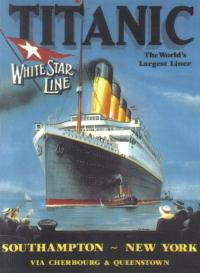
A promotional flyer for the ill-fated ship. If it were not for Pirrie’s ‘cost-plus’ method of pricing, the Titanic would never have been the opulent palace that she was. The final price to the buyer was the ‘cost’ of the raw materials and labour ‘plus’ a fixed percentage for profit. The higher the cost, the larger the profit percentage would be. Such policies allowed Pirrie to indulge fully his taste for epic, luxurious grandeur! Although they also encouraged wasteful spending and inefficiencies, such pricing policies allowed Pirrie free rein to construct some of the most beautiful marvels in maritime history. (Harland & Wolff)
From Unionist lord mayor to ‘turncoat’
William Pirrie was firmly in the unionist camp in 1886, when Parnell openly mocked the Unionists’ desire for a separate parliament for Ulster. Parnell’s flippancy was grounded in the fact that outside the greater Belfast area Catholics formed a larger proportion of the Ulster population than Protestants were willing to admit. What made the Unionists so formidable, however, was that their concentration in Antrim and Down coincided with their concentration of control over industry in those counties. In a pamphlet entitled From Liberal Ulster to England the economic fears of the Unionists were outlined. They feared that a Dublin parliament would tax the northern industries in order to subsidise the south and establish competing industries outside Ulster. This was the view in 1893 when the Ulster Defence Union was formed, with Pirrie as its honorary treasurer. (He even considered the possibility of relocating the shipyard to Britain should Home Rule become law, asserting that under an Irish parliament Belfast could not continue to prosper for want of commercial confidence.) His election to Belfast Corporation and the Harbour Commission in 1894 cemented his ties with Unionism. The Corporation, comprised of northern business élites, was a notable anti-Home Rule organisation devoted to utilising politics in order to protect the economic status quo.Upon becoming lord mayor on 2 January 1896, Pirrie described himself as a liberal unionist. He disappointed loyalist opinion by renouncing his political affiliations and supporting some degree of representation for the Nationalist and Labour parties. Labelled a turncoat, he found himself facing stiff Unionist opposition. In 1899 the Unionists opposed Pirrie’s candidate for a vacant seat on Belfast Corporation. In 1902 he was further humiliated when the Conservative [Unionist] Association selected Charles Dunbar-Buller, a man with no ties to Belfast, as its candidate for the South Belfast parliamentary seat in opposition to Pirrie. This check to his parliamentary ambitions cooled relations even further with the traditional Unionist leaders, many of whom were notable business figures themselves. In a fit of pique, Pirrie financed working-class independent unionist Thomas Sloan, who was running against the Unionist candidate. Sloan’s victory suggests that the Unionists’ traditional support base was waning and that an Ulster unionism based on the defence of social and economic privilege for the middle classes could not be preserved. Unionism was splintering; the Ulster Unionist Council was formed in 1905 upon the realisation that Conservative support in England could not be guaranteed. Ulster Unionists were becoming a distinct voice, as ready to resist their traditional masters at Westminster as any threat from Dublin.
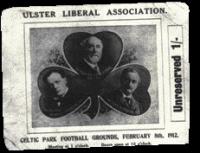
A ticket for the Ulster Liberal Association rally in support of Home Rule organised by Pirrie at Celtic Park football ground on 8 February 1912. Pirrie was subjected to hooting and a fusillade of rotten eggs, small bags of flour and other missiles, many thrown by his own shipyard workers. (Linen Hall Library)
Began to favour Home Rule from 1902
Attitudes were changing. The Liberals returned in 1906 and by 1910 Home Rule was once again at the forefront of British politics. That the Liberals were forced to comply with Irish demands to secure parliamentary support ignores the fact that Home Rule was becoming popular with the British electorate, who came to view it as a vehicle for the development of popular ideas and liberty. Pirrie had declared in favour of Home Rule as early as 1902. Eugenio Biagini suggests that the primary focus of the Ulster Liberal Association, to which Pirrie belonged, was economic and commercial rather than religious. It sought to implement what it perceived as the legitimate aims of Home Rule in order to quash revolutionary ideas incompatible with free trade and economic liberty. Pirrie regarded Home Rule as inevitable and sought to secure power for the industrial north-east in any new Dublin parliament.
Business and politics were closely aligned in Victorian Britain and Home Rule was popular amongst Pirrie’s British business colleagues, notably
John and Owen Philipps of the Royal Mail Shipping Group (RMSG). The RMSG had close ties with Harland & Wolff and Pirrie could not afford to lose its business. Pirrie was also a man of intense social ambition and aspired to a place in London society, to which the Philipps brothers held the keys. He was also most likely aware of the need to ingratiate himself with the government following the furore caused by his involvement with the International Mercantile Marine (IMM). Pirrie represented IMM interests in Britain on condition that his shipyard be the sole builder for the new combine, working on a ‘cost-plus’ basis. An attempt by American financier J.P. Morgan to monopolise North Atlantic shipping, the IMM is most notable for its ownership of the Titanic. Its failure to live up to expectations caused Pirrie financial difficulties and caused him to rely more heavily on business generated by the Philipps brothers, both of whom were keen Home Rulers.
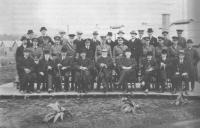
Pirrie (centre, front row) with Ministry of Shipping staff in 1918. During the Great War Lloyd George appointed Pirrie controller general of merchant shipbuilding. He was phenomenally successful at replacing tonnage lost to German U-boats. (Harland & Wolff)
Home Rule Ireland as a pillar of the British Empire
Pirrie used the occasion of the postmaster-general’s visit in October 1911 to espouse his support for Home Rule and to launch an attack on the Belfast Harbour Board, which Pirrie viewed as representing the conservative Unionist forces that had previously thwarted his political ambitions. Pirrie alleged that in 1903 the Harbour Board had denied his firm land needed for expansion because of his support for Home Rule. The Ulster Echo lamented it as a ‘small and mean revenge on the Belfast Unionists for not having given him [Pirrie] the honours that he secured from others’. The response of the Harbour Board was swift. Its official statement declared that the board was a commercial body, with no questions of religion or politics ever having been discussed. It went on to detail the expenditure incurred on behalf of Harland & Wolff for expansion of its facilities, a sum of £514,934 14s 8d. The postmaster-general, Herbert Samuel, considered unionism a purely anti-Roman Catholic movement and concluded that a Dublin parliament would see Ireland become a pillar of the British Empire, as ‘it will attract able men of business capacity who will marvellously develop the resources, industries and general economic prosperity of the country’. A man of ‘practical politics’, the prospect of being one of Ireland’s ‘able men’, along with Samuel’s assertion that Ireland’s separation from the British Empire was an impossibility, likely appealed to Pirrie’s sense of business and ambition.Pirrie organised an Ulster Liberal meeting in the Ulster Hall for January 1912, and John Redmond and Winston Churchill were invited to speak in favour of Home Rule. The meeting incensed Unionists, who booked the hall the night before and refused to vacate it for the Liberals’ meeting. The press denounced Pirrie, claiming that the choice of venue was akin to ‘denouncing the monarchy from the steps of Buckingham Palace!’ The Belfast Evening Telegraph reported that Pirrie’s shipyard workers took the opportunity to attend the reconvened meeting in Celtic Park on 12 February. Pirrie was subjected to hooting and a fusillade of rotten eggs, small bags of flour and other missiles. It was a marked contrast to the previous evening, when Sir Edward Carson, Lord Londonderry, Captain Craig and other Unionist leaders had enjoyed an enthusiastic send-off as they proceeded to London for the opening of parliament. The loss of the Titanic followed only months later, and Pirrie is said to have visibly aged considerably as a result of both the civil unrest in Belfast and the loss of his nephew, Thomas Andrews, on the ship. The political agitation continued to escalate as the Unionists banded under the leadership of Edward Carson, and civil war loomed as a distinct possibility as rioting broke out in Belfast. As the city’s largest employer, many acts of sectarian violence took place in Pirrie’s shipyard and highlighted the fierce sectarianism inherent within Harland & Wolff’s predominantly Protestant labour force. Then in 1914 Ireland took a step back from the centre stage of British politics as the world went to war.
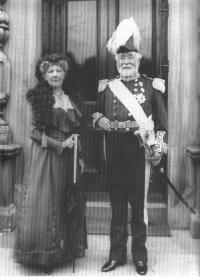
Lord and Lady Pirrie outside their home, Ormiston House in Belfast, on their way to the opening of the Northern Ireland parliament in June 1921. Pirrie wears the uniform of an Irish privy councillor. (Harland & Wolff)
Controller general of merchant shipbuilding
The relentless and hugely successful sinking of allied shipping by Germany prompted Lloyd George to appoint Pirrie as the controller general of merchant shipbuilding in an attempt to replace the heavy tonnage losses. He was phenomenally successful; during 1918 alone Harland & Wolff completed 201,070 gross tons of merchant vessels, 120,000 tons more than their nearest rivals! Under his direction output was raised nearly 50% by the time of the armistice. His war service earned him the place in public life that he had hankered after for so long and marked his return to the unionist fold. He has been accused of deserting Home Rule in the light of the public praise bestowed upon him from London. The reality was that the Home Rule politics of 1912 bore little resemblance to the new face of nationalism. The 1916 Rising and the meteoric rise of Sinn Féin, from 1917 a party dedicated to no less than the formation of a republic, forced Pirrie’s return to unionism. With practical consistency, Pirrie deemed Home Rule as much a hopeless cause as Unionism had been in 1912. He had little sympathy with the Liberals’ policies on state intervention in industry and nationalisation, an attitude shared by many of his business acquaintances. Unlike other shipbuilding regions following the war, Pirrie kept Harland and Wolff’s slipways busy and the workforce kept rising to a peak of 30,000. Although he continued to stress his non-sectarian attitude to Catholic workers, notices were posted in his yard and workers organised to drive out Catholic workers and socialists whom they deemed to be ‘disloyal’ as partition approached. Upon the opening of the Northern Ireland parliament, the king conferred a viscountcy on Pirrie for ‘valuable services to the government’ during the war. On 13 July 1921 he took his seat in the House of Lords, an ironic finale to a political career that had seen him, only a decade earlier, enthusiastically support the removal of the Lords’ veto that had heretofore blocked Home Rule.
Conclusion
Whilst religion continues to occupy a central place in the Home Rule debate, the political trajectory of William Pirrie illustrates that Protestant Ulster was far from having one voice in decrying Home Rule. A Presbyterian liberal, Pirrie sought to appease what he considered legitimate demands for self-government and thus ‘kill Home Rule with kindness’. In doing so his political career tracks the splintered nature of unionism and its evolution into a movement whereby Westminster would be as much defied as any Dublin parliament that sought to impose itself against its will. Pirrie was, above all else, a practical man. When nationalism evolved into a force that would have seen his shipyard fall under a Dublin-based parliament whose tariff measures were harmful to industry, he was forced back into the unionist fold to ensure the survival of the empire that he had built. His service during the First World War had earned him the social prestige he had always craved. Home Rule was no longer his ticket to a prominent position in Irish public life. Upon the creation of Northern Ireland, he continued to employ his energies in securing work to keep the shipyard busy. The shipyard workers of Belfast may not always have agreed with their employer, but it was thanks to Pirrie as much as to Carson or Craig that the six counties were able to secure their exclusion from the new Irish state. As Jonathan Bardon concluded in A history of Ulster, Northern Ireland ‘could not have been achieved but for the economic vitality of their stronghold, Belfast’. HI
Glenn Simpson has an MA in history from Queen’s University, Belfast.
Further reading:
J. Bardon, A history of Ulster (Belfast, 1992).E. Biagini, British democracy and Irish nationalism, 1876–1906 (New York, 2007).H. Jefferson, Viscount Pirrie of Belfast (Belfast, 1947).M. Moss & J. Hume, Shipbuilders to the world: 125 years of Harland & Wolff (Belfast, 1986).
















